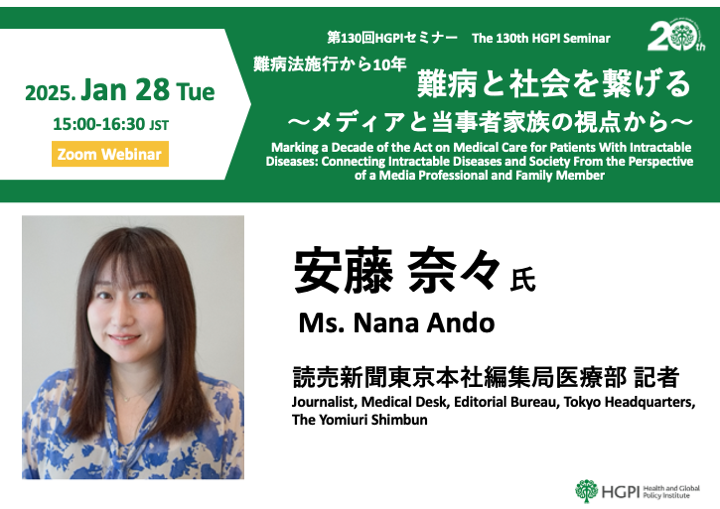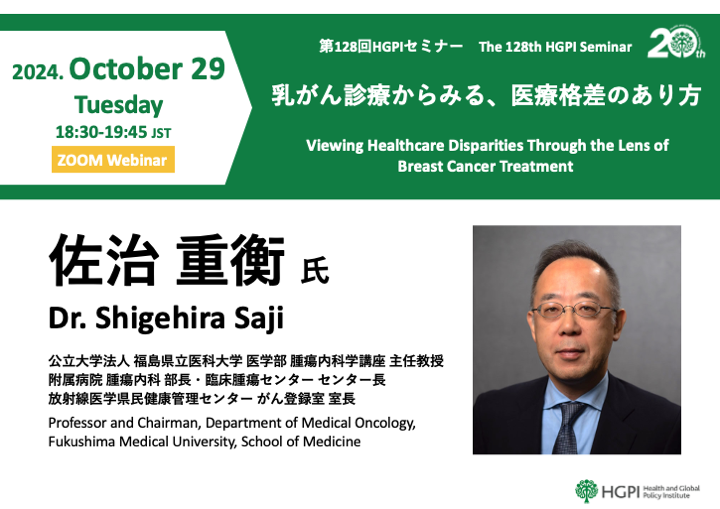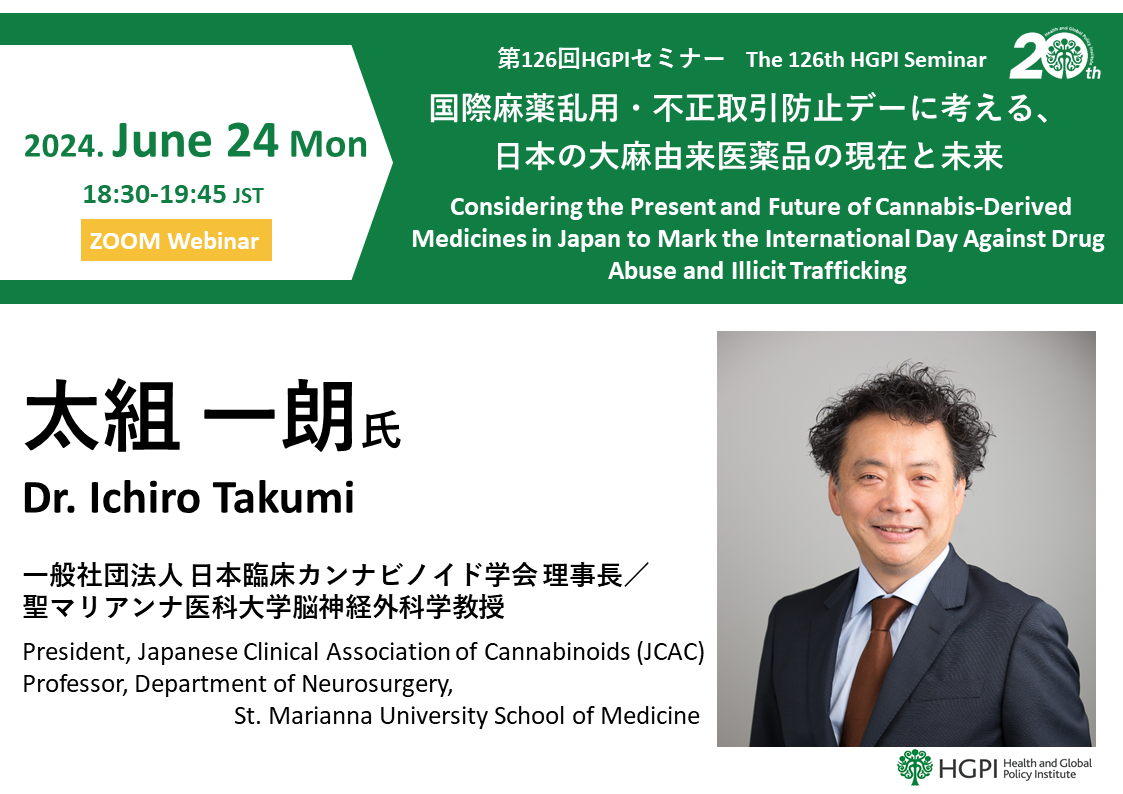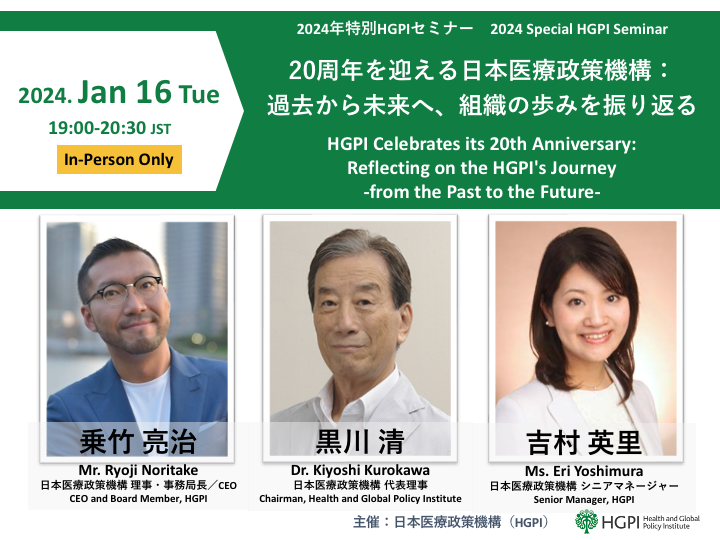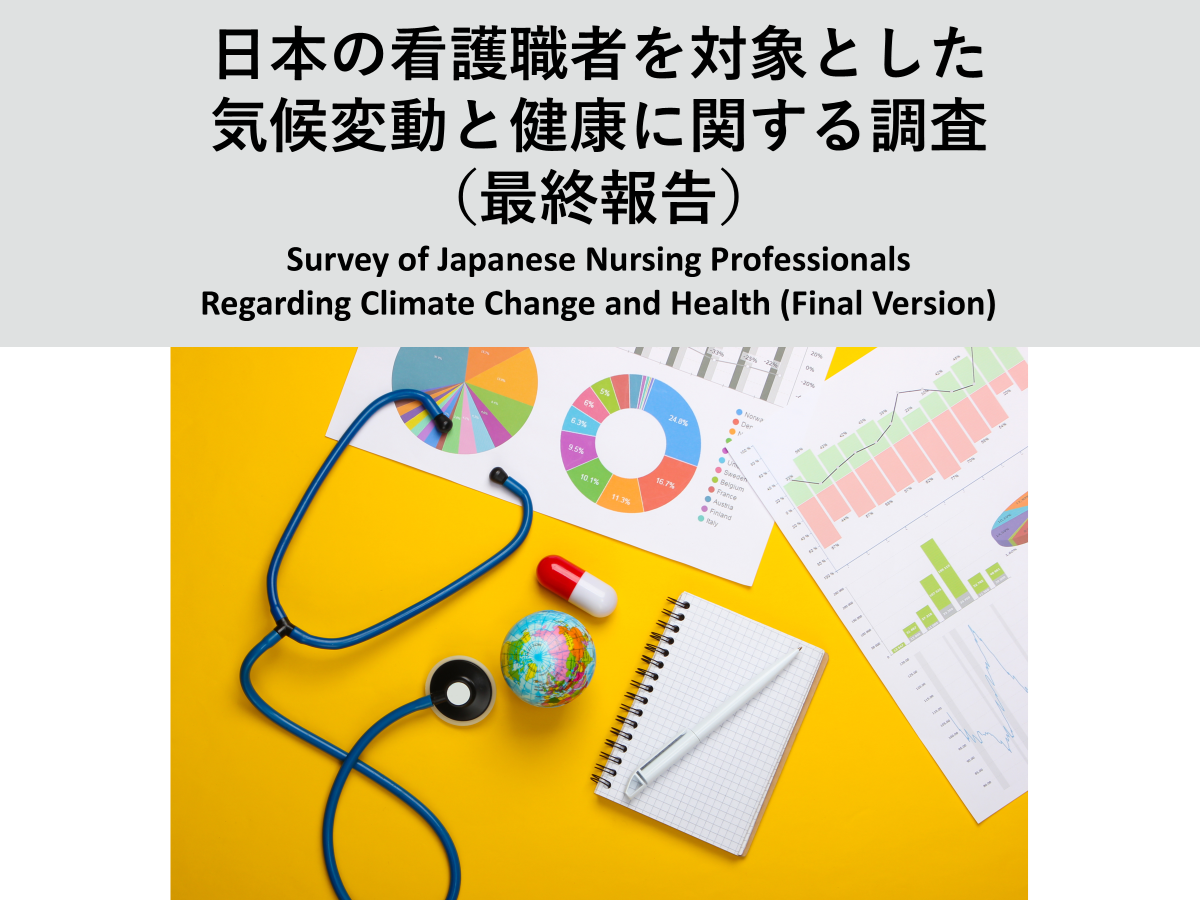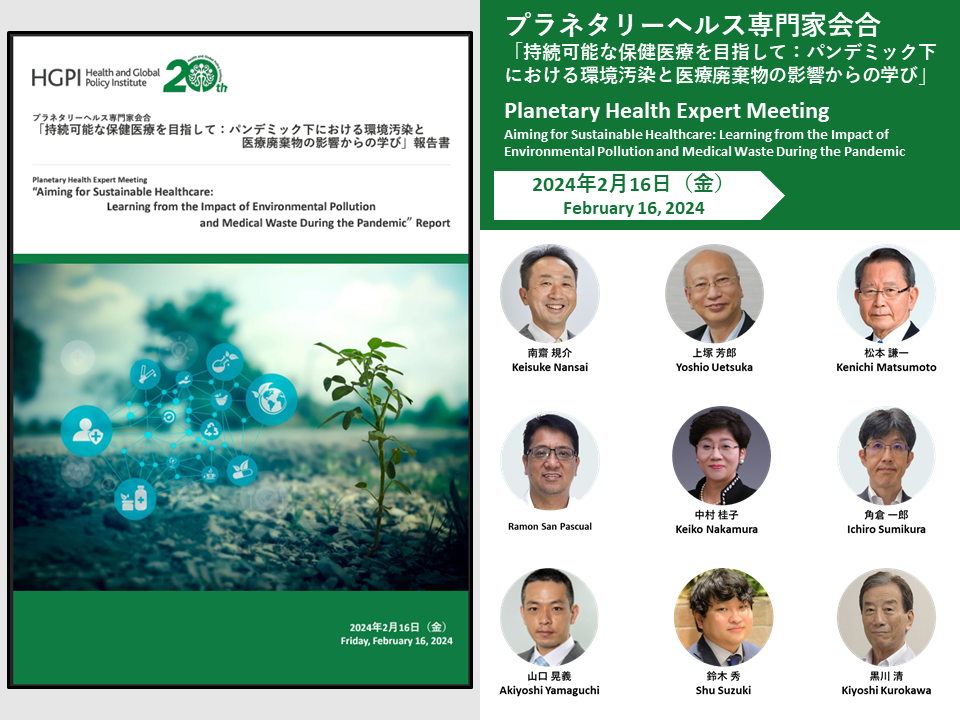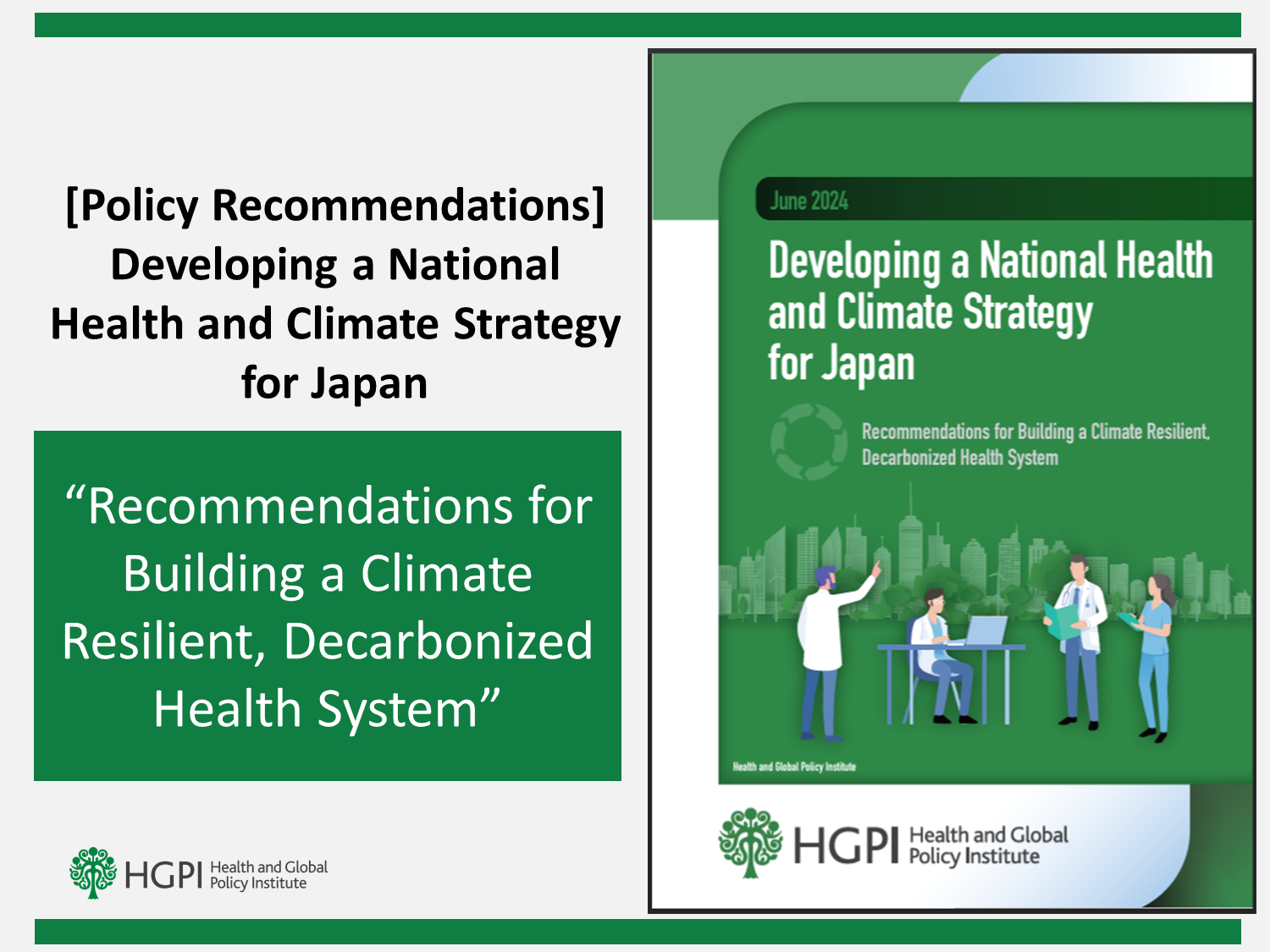[Event Report] The 129th HGPI Seminar “The Connection Between Planetary Environment and Human Health as Seen Through the JECS and Future Expectations” (December 23, 2024)
date : 1/21/2025
Tags: HGPI Seminar, Planetary Health
![[Event Report] The 129th HGPI Seminar “The Connection Between Planetary Environment and Human Health as Seen Through the JECS and Future Expectations” (December 23, 2024)](https://hgpi.org/en/wp-content/uploads/sites/2/hs129-top-1.png)
The 129th HGPI Seminar featured a presentation by Dr. Shin Yamazaki, Director of the Japan Environment and Children’s Study (JECS) Programme Office, National Institute for Environmental Studies. Under the theme ” The Connection Between Planetary Environment and Human Health as Seen Through the JECS and Future Expectations,” Dr. Yamazaki provided a comprehensive lecture that covered the historical background of environmental epidemiology and the latest research findings.
Key points of the lecture
- Minamata disease, a cornerstone case in environmental epidemiology, underscores the critical importance of scientifically investigating the health impacts of environmental factors.
- The JECS, initially planned to follow participants until the age of 13, has been extended to age 18, with consideration for further extension to approximately age 40. This long-term tracking enables a comprehensive understanding of the impacts of environmental factors on health across the lifespan.
- Over 480 peer-reviewed English articles have already been published, offering diverse findings on the health impacts of chemical substances such as blood metal concentrations, per- and polyfluoroalkyl substances (PFAS), and neonicotinoid pesticides. These findings have significantly contributed to the development of guidelines and the consideration of regulatory measures.
- Addressing environmental challenges requires not only regulations but also the development of new scientific technologies and next-generation education. Enhancing children’s education and learning motivation has the potential to drive innovation and lead to solutions for future environmental issues.
The Origins of Environmental Epidemiology: The Importance of Scientific Investigation as Learned from Minamata Disease
Minamata disease, caused by methylmercury, serves as a historically significant case highlighting the importance of scientifically uncovering the health impacts of environmental factors. Beginning around 1956, clusters of unusual cases emerged, with the incidence rate among fishing households exceeding that of non-fishing households by more than 20 times. Epidemiological findings played a pivotal role in identifying the cause. This case stands as a historical lesson emphasizing the necessity of scientifically linking environmental factors to health damage. Furthermore, this lesson led to amendments in laws such as the Food Sanitation Act, enabling regulations even when health impacts are suspected.
The JECS: Comprehensive Research on Environmental Factors and Child Health
In 1997, the “Miami Declaration” was adopted at the G8 Environment Ministers’ Meeting, recognizing the global threats posed by harmful substances in the environment to children and declaring the need for prioritized efforts to address pediatric environmental health issues. Since then, countries worldwide have been collecting scientific knowledge in this area. In Japan, the “Japan Environment and Children’s Study (JECS)” was initiated in 2010 under the Ministry of the Environment. The study aims to elucidate how external environmental factors (primarily chemical substance exposure, along with social and lifestyle factors) and internal factors (genetic predispositions) affect children’s growth and development. This nationwide survey involves 100,000 parent-child pairs.
Initially, the study planned to track participants up to age 13, but this has been extended to age 18, with plans to further extend tracking to approximately age 40. This long-term tracking enables a more detailed understanding of the lifelong impacts of environmental factors on health.
The study’s methodology and scope are continually refined with reference to international examples, ensuring its effectiveness in uncovering comprehensive insights into the relationship between environmental factors and human health.
Research Outcomes: New Findings on the Health Impacts of Chemical Substances
To date, the JECS has produced over 480 peer-reviewed English articles, offering significant insights into the health impacts of various chemical substances. For instance, studies on maternal blood metal concentrations during pregnancy have revealed relationships between cadmium levels and birth size, the risk of preterm birth, and neurodevelopmental outcomes. Investigations into lead concentrations have also identified associations with birth size. Additionally, research on emerging chemical substances, such as per- and polyfluoroalkyl substances (PFAS) and neonicotinoid pesticides, have been published.
The Significance of the JECS
The JECS plays a vital role in generating scientific evidence that informs risk management authorities and businesses, contributing to the establishment of appropriate risk management systems. For example, its findings have been utilized in materials produced by the Food Safety Commission and in the development of guidelines on maternal and child health. The study also enhances public risk literacy by disseminating its research results to the general population. In addition, it serves as a foundation for the storage and use of biological samples, playing a key role in fostering researchers in the field of environmental health. Overall, the JECS is an essential initiative for preparing the nation to address future environmental risks effectively.
Future Outlook: A Comprehensive Approach to Solving Environmental Issues
To address environmental challenges, it is crucial to adopt evidence-based regulatory approaches that encourage shifts in lifestyles and economic and industrial activities. However, regulatory measures alone are not sufficient. Advancing scientific and technological innovation and promoting next-generation education are equally essential for resolving global environmental problems. Fostering children’s creativity and enthusiasm for learning through education can stimulate academic research and industrial and economic activities. This, in turn, can create a virtuous cycle that drives the development of innovative technologies capable of fundamentally solving environmental issues.
[Event Overview]
- Speaker: Dr. Shin Yamazaki (Director, Japan Environment and Children’s Study Programme Office, National Institute for Environmental Studies)
- Date & Time: Monday, December 23, 2024; 18:30-19:45 JST
- Format: Online (Zoom webinar)
- Language: Japanese
- Participation Fee: Free
■Profile
Dr. Shin Yamazaki (Director, Japan Environment and Children’s Study Programme Office, National Institute for Environmental Studies)
After completing a doctoral program at the Graduate School of Medicine, Kyoto University, in 2006, he was appointed Associate Professor at the Graduate School in 2007. In 2015, he became the Head of the Environmental Epidemiology Section at the National Institute for Environmental Studies. He later served as the Deputy Director of the Center for Health and Environmental Risk Research in 2017 and has been the Director of the Japan Environment and Children’s Study Programme Office since 2019, a position he holds to date.
Top Research & Recommendations Posts
- [Research Report] Perceptions, Knowledge, Actions and Perspectives of Healthcare Organizations in Japan in Relation to Climate Change and Health: A Cross-Sectional Study (November 13, 2025)
- [Research Report] The 2025 Public Opinion Survey on Healthcare in Japan (March 17, 2025)
- [Policy Recommendations] Reshaping Japan’s Immunization Policy for Life Course Coverage and Vaccine Equity: Challenges and Prospects for an Era of Prevention and Health Promotion (April 25, 2025)
- [Research Report] AMR Policy Update #4: Cancer Care and AMR (Part 1)
- [Research Report] The 2026 Public Opinion Survey on Healthcare in Japan (February 13, 2026)
- [Policy Recommendations] The Path to a Sustainable Healthcare System: Three Key Objectives for Public Deliberation (January 22, 2026)
- [Research Report] The 2023 Public Opinion Survey on Satisfaction in Healthcare in Japan and Healthcare Applications of Generative AI (January 11, 2024)
- [Research Report] Building a Mental Health Program for Children and Measuring its Effectiveness (June 16, 2022)
- [Policy Recommendations] Developing a National Health and Climate Strategy for Japan (June 26, 2024)
- [Policy Recommendations] Mental Health Project: Recommendations on Three Issues in the Area of Mental Health (July 4, 2025)
Featured Posts
-
2026-01-09
[Registration Open] (Hybrid Format) Dementia Project FY2025 Initiative Concluding Symposium “The Future of Dementia Policy Surrounding Families and Others Who Care for People with Dementia” (March 9, 2026)
![[Registration Open] (Hybrid Format) Dementia Project FY2025 Initiative Concluding Symposium “The Future of Dementia Policy Surrounding Families and Others Who Care for People with Dementia” (March 9, 2026)](https://hgpi.org/en/wp-content/uploads/sites/2/dementia-20260309-top.png)
-
2026-02-05
[Registration Open] (Webinar) The 141st HGPI Seminar “Current Status and Future Prospects of Korea’s Obesity Policy: Voices of People with Lived Experience in Policy Promotion” (March 3, 2026)
![[Registration Open] (Webinar) The 141st HGPI Seminar “Current Status and Future Prospects of Korea’s Obesity Policy: Voices of People with Lived Experience in Policy Promotion” (March 3, 2026)](https://hgpi.org/en/wp-content/uploads/sites/2/hs141-top-1.png)
-
2026-02-27
[Registration Open] (Webinar) The 142nd HGPI Seminar “World Kidney Day 2026” Theme in Focus: The Current State of Green Nephrology and Green Dialysis—Balancing Kidney Health and Planetary Health (March 10, 2026)
![[Registration Open] (Webinar) The 142nd HGPI Seminar “World Kidney Day 2026” Theme in Focus: The Current State of Green Nephrology and Green Dialysis—Balancing Kidney Health and Planetary Health (March 10, 2026)](https://hgpi.org/en/wp-content/uploads/sites/2/The142nd_HGPI_Seminar.jpg)




